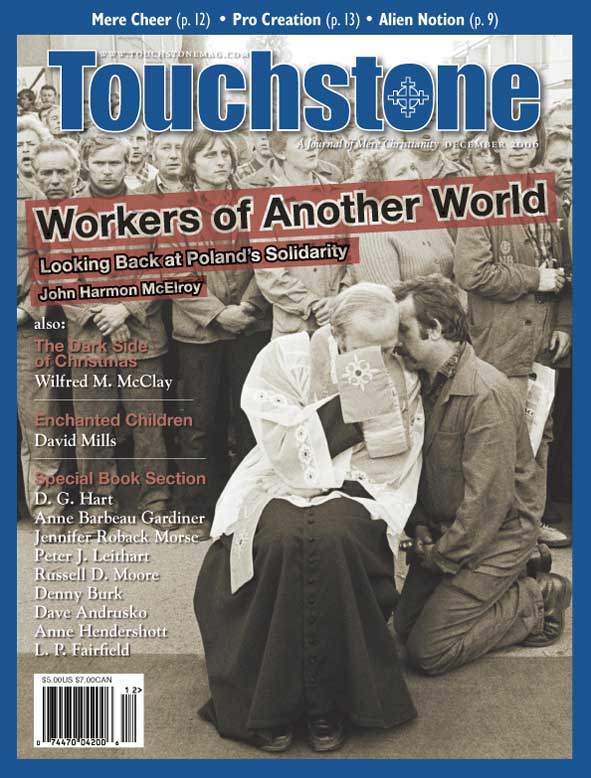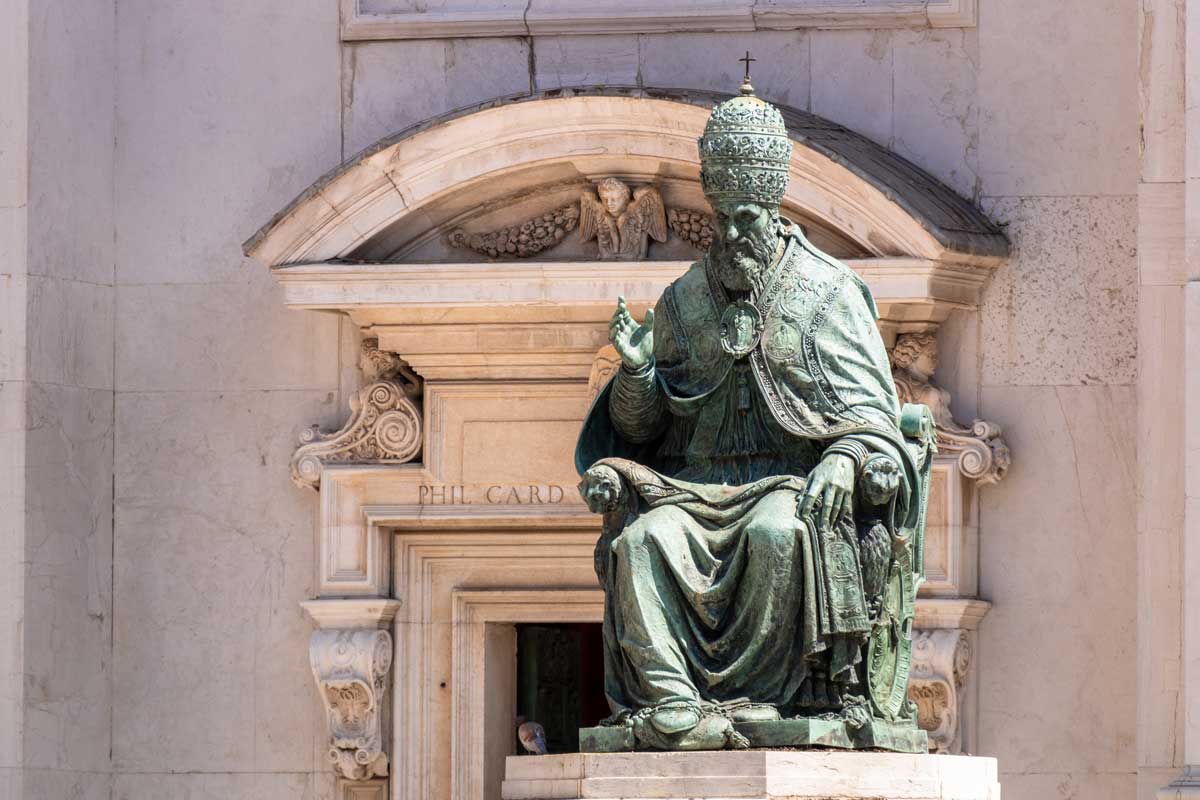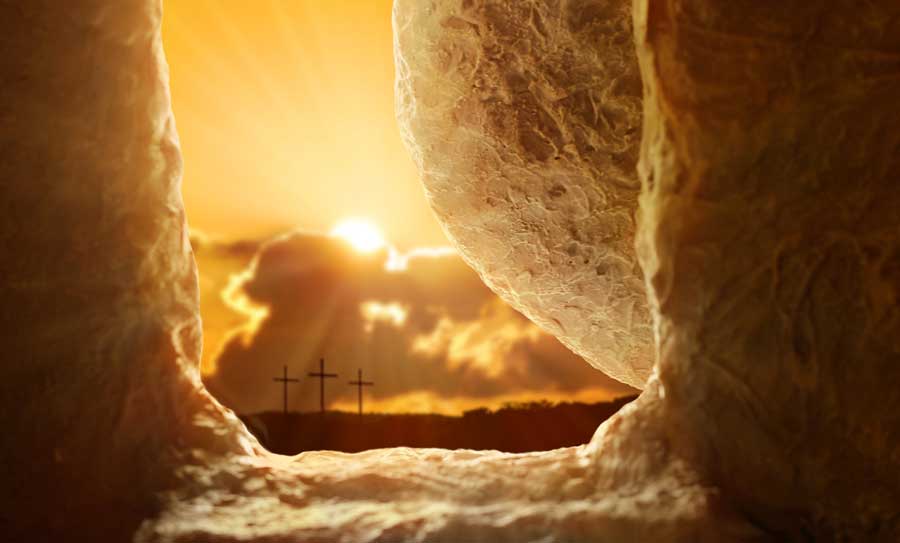The French Invention
The Conversion of Imagination:
From Pascal Through Rousseau to Tocqueville
by Matthew W. Maguire
Harvard University Press, 2006
(285 pages, $49.95, hardcover)
reviewed by Peter J. Leithart
In his Victorian Fantasy (happily reprinted last year in an updated edition), the literary historian Stephen Prickett writes that between 1775 and 1825, “something extraordinary” happened to the imagination: “From being terms of derision, or descriptions of daydreaming, words like ‘fantasy, and ‘imagination, suddenly began to take on a new status as hurrah words.”
Imagination’s Triumph
“Imagination” remains a hurrah word today, more than ever. Critical theorists strive for “imaginative” insights, postmodern philosophers see imagination as the pathway through the veil of sublime to that Unnamable Something beyond, the spiritually inclined appeal to religious imagination, and John Lennon’s musical exhortation to “Imagine” is still familiar enough for hip advertisements. As Matthew Maguire says in his provocative new book, “imagination” lends a “perceptible glow” to any word in its vicinity.
Prior to the modern period, this “exalted imagination” would have been, well, unimaginable. How did we get here? The story is complex, and The Conversion of the Imagination, first written as the author’s Ph.D. dissertation, does not pretend to tell it all.
Maguire, who teaches history at Kenyon College, contents himself with uncovering a crucial but largely neglected subplot in the story of imagination’s triumph. Most accounts of the imagination focus on Romanticism, and often on the Anglo-German axis of Romanticism.
Maguire examines French thinkers, mainly of the pre-Romantic period. Moving from Pascal through Rousseau to Tocqueville, he explores transformations within the “shared, precise, and dynamic configuration of language within and surrounding imagination” common to his three main writers.
His book is dense and challenging. It is not a beach read, and he will never have to worry over competing bids for movie rights. His argument proceeds through close readings of primary texts, interspersed with occasional arguments with other interpreters, and the overall thrust of the argument sometimes gets lost in the detailed attentiveness of his textual interpretations.
Following the twists of the texts is a rewarding exercise, however, since the book is intellectual history of a very rare order. Maguire is a careful and, dare I say, imaginative reader, alert to turns in argument and rhetoric. How many readers of Democracy in America have noticed that Tocqueville uses some form of imaginer over a hundred times?
He is clearly well informed about contemporary thought, but politely allows the writers he examines to set their own terms as they address their own problems, not ours. Because of his carefulness, he offers fresh historical insights and opens up new angles for pondering modern culture and its culmination, or collapse, in postmodernism.
Pascal’s Solution
There are illuminating surprises. Pascal, for instance. Pessimistic Augustinian that he is, Pascal is often read as an enemy of imagination. And so he is: For Pascal, imagination dominates reason and even conscience, makes truth and falsehood indistinguishable, and sustains pride, the deadliest of the Seven Deadlies.
But Maguire convincingly demonstrates that the expansion of imagination does not begin with writers like Hobbes and Spinoza, who reject the traditional Christian suspicion of imagination. It begins with the deeply religious Pascal, despite his debts to the patristic and medieval past.
Pascal claims that imagination is essential to society. Its social and political functions are unavoidable and unobjectionable conditions of human life. It “gives respect and veneration to people, to works, to laws, to the great,” so that all the “riches of the world” are “inadequate” unless endorsed by imagination.
In emphasizing the role of imagination, however, he greatly expanded its scope and power. Imagination possesses for him what Maguire calls a “demiurgic” power to shape experience. Impelled by imagination, Pascal says, we seek happiness in illusory diversions, hoping to forget our mortality. His only solution to this is a radical renunciation of the world and of imagination, in order to seek true happiness in God.
Pascal’s achievement becomes clearer when his work is compared with that of St. Augustine. In Book X of the Confessions, Augustine views memory as the place where the self encounters itself, and where the soul sorts through its relations with the world and with God. In an epochal shift, Pascal relocates all this into the imagination, and in the process disrupts the unified experience Augustine found in memory.
Memory is a vast reality for Augustine, but it has some anchor in the real world, which is the world of other people. If I’m constituted by my memories, that means I’m constituted by spankings from parents, lectures from teachers, summer afternoons at the pool, and the baseball that bruised my elbow in Little League. I may forget these things, and thus, apparently, lose part of myself, but for Augustine, forgetting is, curiously, a mode of memory, a memory of something absent.
By contrast, exalted imagination has no inherent constraints. Like Milton’s Satan, I can imagine I am author of myself, unique and without precedent. I can imagine that everyone else is a bit player in a world-drama starring me, or that they are all figments of my imagination. Without wanting to, without perhaps quite knowing what he was doing, Pascal unmoored the self from itself, and from the world, when he unhitched it from memory and hooked it to imagination.
Rousseau’s Perfectability
Building on Pascal’s substitution of imagination for memory, Rousseau moved from an “exalted” imagination (as Pascal’s view can be called) to posit an “infinite” one. As Rousseau himself put it, “The real world has its limits, the imaginary world is infinite; not being able to enlarge the one we shrink the other; for all the troubles that make us truly unhappy are only born from their differences.”
But we aren’t capable of shaping the world so that it becomes what we imagine it to be. How can we navigate through a world whose hard edges don’t yield to our desires? Shrinking imagination is one option, one that Rousseau explores in his discussions of perfectibility. Perfectibility is the impulse to control the world in order to close the gap between how we want the world to be and the way it is. Perfectibility is the drive to shape recalcitrant reality according to our dreams.
Because imagination is infinite and stimulates infinite desires, Rousseau is ambivalent about perfectibility. We can shape reality in accord with infinite desires only if we have infinite power, and so the drive of perfectibility is a drive toward tyranny. Perfectibility in its savage natural state leads to vice.
Virtue, for the early Rousseau, is the voluntary limitation of imagination, and hence of perfectibility, and the strength to direct desire into legitimate channels. Thus “denatured,” perfectibility turns inward and has the potential to shape imagination into edifying forms.
Virtue doesn’t come of itself. To achieve virtue, imagination must be stabilized, channeled, and limited through education, general opinion, and habit. People need the guidance of a “legislator,” someone who employs useful illusions or fables, such as Rousseau’s own imaginative books, to give form to the chaotic imagination.
By the time he writes his own Confessions, however, Rousseau decides that only a virtual reality can achieve what imagination urges us to want to achieve. Rousseau renounces the need for limiting illusions because he renounces the need to realize his desires in reality. He renounces perfectibility and instead delights in the purity of untouched nature.
He withdraws to a world of pure imagination, where he can, for instance, indulge sexual fantasies while remaining “pure” in the flesh. He aspires to float on an ocean of pure imagination, transcending self and his world in flights of infinite fantasy.
One would expect memory to play a primary role in Rousseau’s autobiographical work, but imagination has swallowed up memory, lending an imaginative luminosity to the dull facts of his actual life. With Rousseau’s Confessions, the displacement of Augustine’s Confessions, and its account of memory, is complete.
The Terror & Tocqueville
Known today as an early political theorist, Tocqueville is another surprise, but Maguire more than justifies his place in a history of imagination. Between Rousseau and Tocqueville stood the French Revolution, a key moment in the history of imagination.
Rousseau’s notion of an infinite imagination attracted many, but the Terror appeared to be a horrifying political expression of human desire unchecked by reality. French thinkers were faced with what they saw as an unfortunate choice between defending the individual imagination against the suffocating “regime of opinion” and trying to control and channel imagination.
Tocqueville’s work is one of the most important post-Revolution explorations of imagination. He closely links imagination with the achievement of his overriding passion, freedom.
Like Pascal, Tocqueville recognizes that imagination nurtures pride; unlike Pascal, he prefers this vice to any number of virtues. At the root of all government, he argues, is “the principle of the sovereignty of the people.” Aristocracies can be established only by denaturing the people with the illusion that some citizens are “permanently raised above” others.
Aristocracies are founded on the nobility’s imaginative ascent above natural limitations and natural equality. Aristocratic regimes nurture proud imagination among their people, and this even spills over to the lower classes. The cornerstone of aristocracy is the idea of “superiority,” and aristocracies are characterized by an energetic striving for superiority.
Aristocratic culture manifests this impulse in many ways: Its theaters depict larger-than-life heroes; its manners are “beautiful illusions about human nature”; its poetry and fiction are not bound by reality. As a result, aristocratic societies achieve a level of freedom, a devil-may-care attitude toward limits, rarely approached by more natural democratic regimes.
Imagination plays no role in the constitution of a democratic regime; democracies bow before the truth of natural equality. Lacking the imaginative ascent characteristic of aristocracy, democracies weigh imagination down: As Maguire puts it, “Tocqueville’s presiding metaphor for democracy [is] a gravitational force acting on imagination.”
Realistic drama and fiction, and colorless fashions, are the best democracies have to offer. Normally, democratic imagination rises no higher than “inventing means of increasing riches and of satisfying the needs of the public.” Tocqueville admires America, but mainly because in America imaginative energy flourishes within a system that suppresses it.
Exalted Oscillation
Beyond the specifics of the story Maguire tells, his book provides a unique angle for examining recurring dilemmas of modern culture. The history of imagination offers needed insight into the history of modern Western man.
Maguire is interested not only in the historical questions, but in the way our thinking about our thinking shapes the way we think, how the way we imagine we experience the world forms that experience. What difference does it make if we think (imagine? feel?) we access the world through reason, or through senses, or through will, or through emotions, or, as many contemporary thinkers believe, through imagination?
Each of these faculties is a filter between the world and our experience of it. What difference, if any, does it make if we believe the filter is imaginative-pink, emotional-red, or rational-gray? Each is a kind of tool; what happens when we change existential technologies, when we stop using sharpened rocks and begin to harness electricity?
A lot, it turns out. The problems of exalted, and eventually infinite, imagination are evident in a fundamental dilemma that runs through Maguire’s history: “Imagination appears as the faculty that sustains, shapes, magnifies, and intensifies all forms of desire,” but this “invariably extend[s] them beyond the point of all satisfaction or satiation outside the imagination.” Equipped with exalted imagination, every human being becomes a courtly lover whose beloved will never live up to his fantasy.
Rousseau illustrates how the exalted imagination lends itself to views of the self that, in Maguire’s words, “often exhibit a strange, spasmic oscillation between demiurgic self-assertion and acquiescent liquefaction in a perceived historical, linguistic, or ontological flux.” That is, exalted imagination either leads to a hyper-modern Prometheanism, in which man becomes God, controlling himself and others, creating himself and his world ex nihilo, or it leads to a postmodern dissolution of the self, in which consuming imagination finally eats up itself.
Isolating these few threads of the complex fabric Maguire describes in this important book illustrates both the breadth of his theme and the need for a thorough reexamination of the exalted imagination. Pascal “invented” it, but left it unredeemed. Is it beyond redemption?
Peter J. Leithart is an ordained minister in the Presbyterian Church in America and the president of Trinity House Institute for Biblical, Liturgical & Cultural Studies in Birmingham, Alabama. His many books include Defending Constantine (InterVarsity), Between Babel and Beast (Cascade), and, most recently, Gratitude: An Intellectual History (Baylor University Press). His weblog can be found at www.leithart.com. He is a contributing editor of Touchstone.
subscription options
Order
Print/Online Subscription

Get six issues (one year) of Touchstone PLUS full online access including pdf downloads for only $39.95. That's only $3.34 per month!
Order
Online Only
Subscription

Get a one-year full-access subscription to the Touchstone online archives for only $19.95. That's only $1.66 per month!
bulk subscriptions
Order Touchstone subscriptions in bulk and save $10 per sub! Each subscription includes 6 issues of Touchstone plus full online access to touchstonemag.com—including archives, videos, and pdf downloads of recent issues for only $29.95 each! Great for churches or study groups.
Transactions will be processed on a secure server.
more on conversion from the online archives
more from the online archives
calling all readers
Please Donate
"There are magazines worth reading but few worth saving . . . Touchstone is just such a magazine."
—Alice von Hildebrand
"Here we do not concede one square millimeter of territory to falsehood, folly, contemporary sentimentality, or fashion. We speak the truth, and let God be our judge. . . . Touchstone is the one committedly Christian conservative journal."
—Anthony Esolen, Touchstone senior editor









